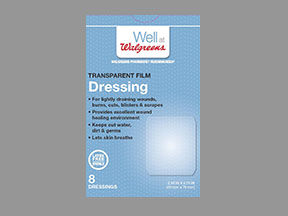
Transparent Film Dressing Coupons & Savings Card – Discount Prices from $27.70
My prescription
Edit
1, Transparent Film Dressing (30 Miscellaneous)
Select pharmacy

Albertsons
$27.70
COUPON PRICE
Walgreens
$27.70
COUPON PRICEFree Transparent Film Dressing Savings Card

Albertsons
$27.70
Show this coupon to your pharmacist
ID
LH7A5AB73D
PCN
HT
BIN
011867
GRP
LABH001
This coupon is not insurance
Our Transparent Film Dressing coupons are free to use. You can print the coupon, email it to yourself, or receive the Transparent Film Dressing coupon via text message. To get your free discount, show the pharmacist your Transparent Film Dressing savings card which has the discounted coupon price. Use our filters below to edit the prescription box to match your needs. The Transparent Film Dressing prices will update based on your prescription needs. Above our Transparent Film Dressing coupons, you can change the location to see pharmacy prices in other areas. Our prescription discount card will update online with the specific pharmacy costs associated with your edits. Be sure to text, email, or print the Transparent Film Dressing savings card code that you need after editing the prescription box and location field. Show the discount card to your pharmacist before paying.
Our Transparent Film Dressing coupons are free to use. You can print the coupon, email it to yourself, or receive the Transparent Film Dressing coupon via text message. To get your free discount, show the pharmacist your Transparent Film Dressing savings card which has the discounted coupon price. Use our filters below to edit the prescription box to match your needs. The Transparent Film Dressing prices will update based on your prescription needs. Above our Transparent Film Dressing coupons, you can change the location to see pharmacy prices in other areas. Our prescription discount card will update online with the specific pharmacy costs associated with your edits. Be sure to text, email, or print the Transparent Film Dressing savings card code that you need after editing the prescription box and location field. Show the discount card to your pharmacist before paying.
Transparent Film Dressing FAQs
Using the SaveHealth discount card, what is the price of Transparent Film Dressing without insurance?
Using the SaveHealth discount card, the price of Transparent Film Dressing without insurance is $27.70.
What is the price of Transparent Film Dressing at Walgreens?
The price of Transparent Film Dressing at Walgreens is $27.70.
